Let’s find out together, in our dedicated review, what are the strengths and weaknesses of Atlas Fallen, the new Deck13 production, the authors of Lords of the Fallen and The Surge
It is now a common conception, both among the public who experience video games and among the critics who talk about them, of necessarily having to be faced with video games with a great impact every time. Whether they are AAA or indie, we talk, chat and elevate only the production that strikes, which aims to excel (successfully or not) in one or more fields and which, in the end, necessarily leaves a mark, for good or bad. We have somewhat lost the ability to enjoy titles “without infamy and without praise”, discrete video games that don’t excel in anything, but that entertain and still know how to make you spend pleasant hours with the pad in hand. Well yes, we did it: welcome to our review of Atlas Fallen.
Derivation | Atlas Fallen review
Atlas Fallen is a title developed by Deck13 (Lords of the Fallen and the two chapters of The Surge) recently arrived on PS5, PC and Xbox Series X | S and what made the company’s compass shift from soulslike towards… “God of War”-like? Atlas Fallen is in fact a very derivative title in all its mechanics, which does not add anything new to the genre it belongs to (that of action-rpg in the third person), but which on the contrary takes a plethora of elements from far more noble productions such as, precisely, God of War. And is this necessarily a bad thing? Absolutely not.
The game puts us in the shoes of a “Nameless” (yes, we won’t be able to give a name to our character) created using a special editor. An editor that, let’s face it, isn’t exactly top of the range, but which nevertheless allows for a fair amount of customization. We are therefore catapulted into the world of Atlas, a predominantly desert land where two distinct entities reign: sand and the god Thelos. Our protagonist is invested with a particularly important mission: once an ancient glove has been found, containing the spirit of an entity called Nyaal, we will in fact be called to fight to master its strength and, finally, defeat the evil Thelos. In Atlas’ society, the Nameless are at the base of the pyramid, on which the nobles and aristocrats stand, located in the big cities.
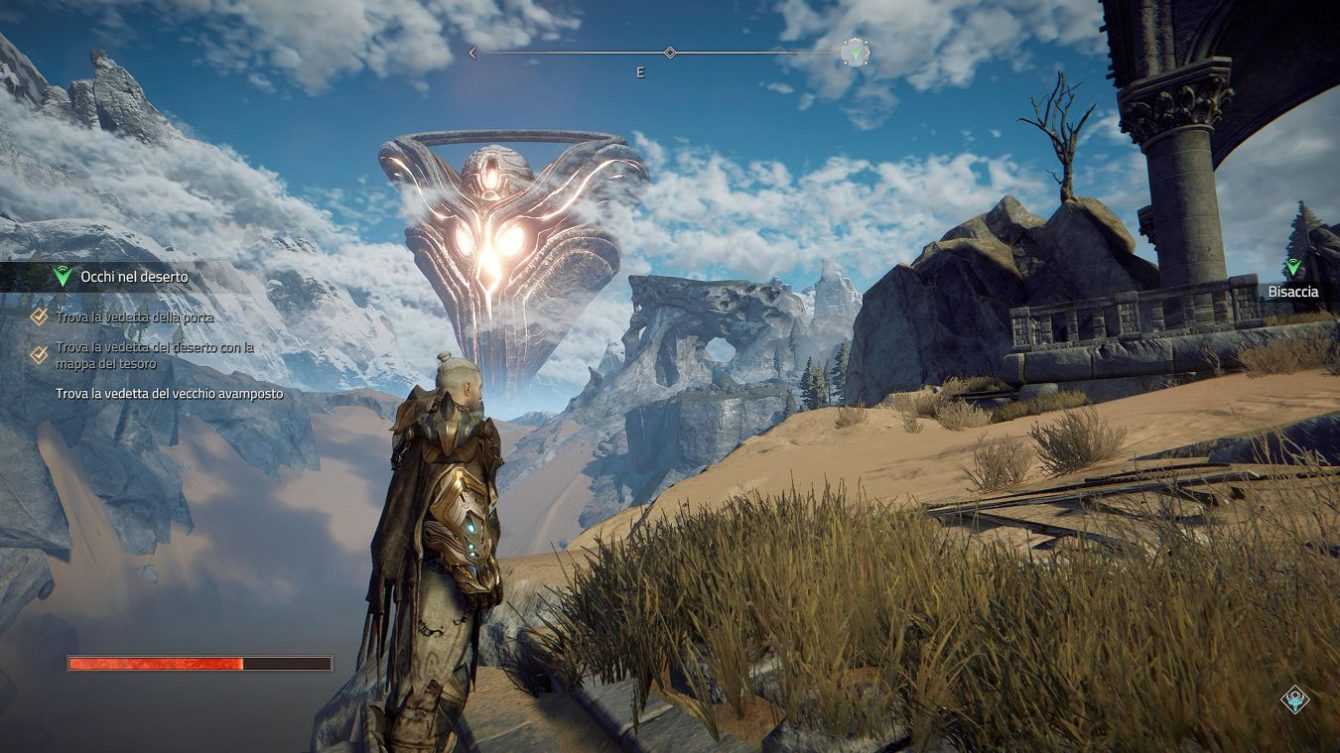
Interest: zero | Atlas Fallen review
We will not reveal more details about the plot simply because it is the weakest point of the whole production. From the first hours we were very little enthusiastic, an enthusiasm that even decreased as we approached the finale. The various twists and turns, telephoned and markedly predictable, failed in any way to solve the solution. The plot of Atlas Fallen is obvious, the lore of the game world is not very thorough (despite the many diaries and scrolls that can be found in the various maps) and no character has managed to be truly memorable, least of all the anonymous (in every sense) hero.
Everything that fascinates about Atlas Fallen lies essentially in its game world, which can be explored from top to bottom thanks to a truly successful gameplay expedient: gliding on the sand. Gliding on the sand dunes of Atlas Fallen gave us an incredibly acute feeling of freedom, perhaps even stronger than the one we had in Forspoken, essentially for two reasons: there is no stamina meter, and fall damage has been completely eliminated. For these reasons, exploring Atlas is damn fun and addictive, but above all extremely free.
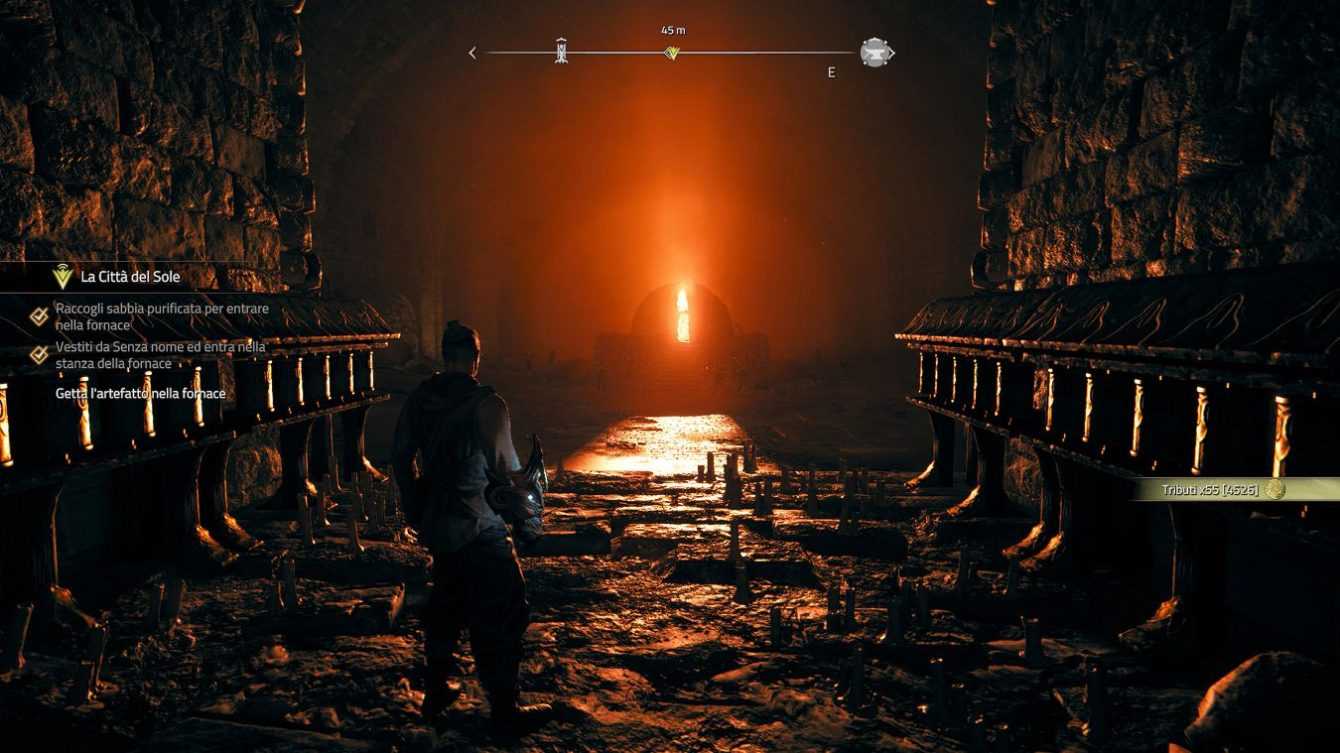
Freedom! | Atlas Fallen review
You will be able to reach the top of almost any building and throw yourself into the void and then immediately resume sliding on the sand, reaching ruins in varied and original ways and covering considerable distances in a short time. As you can well understand from our enthusiasm, what we liked the most in Atlas Fallen is probing every single nook and cranny of every single map (the game is not in fact an Open World, but it consists of several maps connected to each other by very short loads) to find every scroll, every artifact to resell to merchants, and every unique monster to defeat.
And while we’re talking about defeating monsters, let’s also introduce the second gameplay element that makes Atlas Fallen a simply fun game: the combat system. Thanks to the properties of the glove, our protagonist will be able to equip two different weapons (among the three available), one primary and one secondary. The front keys will be used to hit enemies with one of the two, chaining spectacular and unique combos. The backbones will instead be used to parry, dodge and start aerial combos (we will explore this aspect in the next paragraphs).
The gauntlet can be equipped with different Essence Stones, runes that grant passive effects, and active special moves. However, everything is based on a special bar, placed under the life of our protagonist, called Impetus Bar which will fill up by attacking enemies and which will allow us, filling the various sections from time to time, to use the active Essence Stones and, finally, to unleash a devastating attack capable of knocking down even the most dangerous enemies.
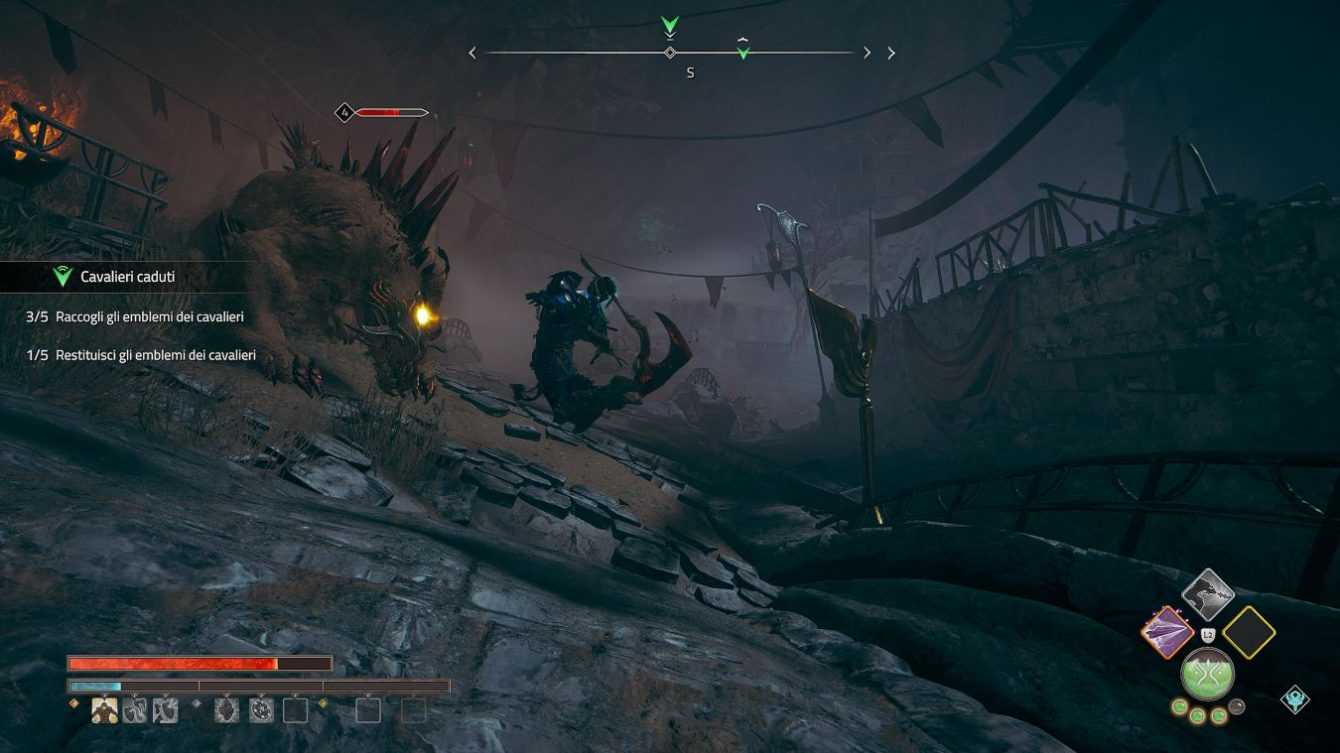
Skin of Stone | Atlas Fallen review
Another particularly interesting mechanic of Atlas Fallen is that of the parry. In this case this is done by activating the effect Skin of Stone which, if done at the right time, will literally freeze enemies. Which is possible even with the most difficult bosses, only that they will have to be “parried” three times in a short time. All this may seem very technical, and in fact perhaps Pelle di Pietra is the most interesting pivot of the whole game, because it forces the player to learn the patterns of the toughest enemies. This despite the fact that the various parriable attacks are preceded by red indicatorswhich suggest its imminent arrival.
In short, the combat system designed by Deck 13 for Atlas Fallen is full of rather interesting elements and which, linked together, make the various battles rather spectacular and adrenaline-pumping, as well as technical at the right point. Unfortunately, everything goes to break in air combat, difficult to control mainly due to a camera that tends to go crazy all too often, especially with large enemies. Something that, if initially it could also be left out considering that we did not encounter flying bosses for several hours of play, but only insignificant minions that perished after just a couple of hits, as the game progressed it became more and more frustrating, reaching the point of making us skip the optional bosses who even just tried to hover off the ground.
The customization of the protagonist in Atlas Fallen ends with the possibility of equip it with armor. There aren’t that many and there are about a dozen, but each of them leans your build towards one or more specific characteristics. However, the armors are all customizable thanks to the dyes that you will find or acquire in the game and to various frills that can be applied to them. And if you really don’t like your favorite armor in terms of performance, you can still resort to transmog (thanks Hogwarts Legacy).
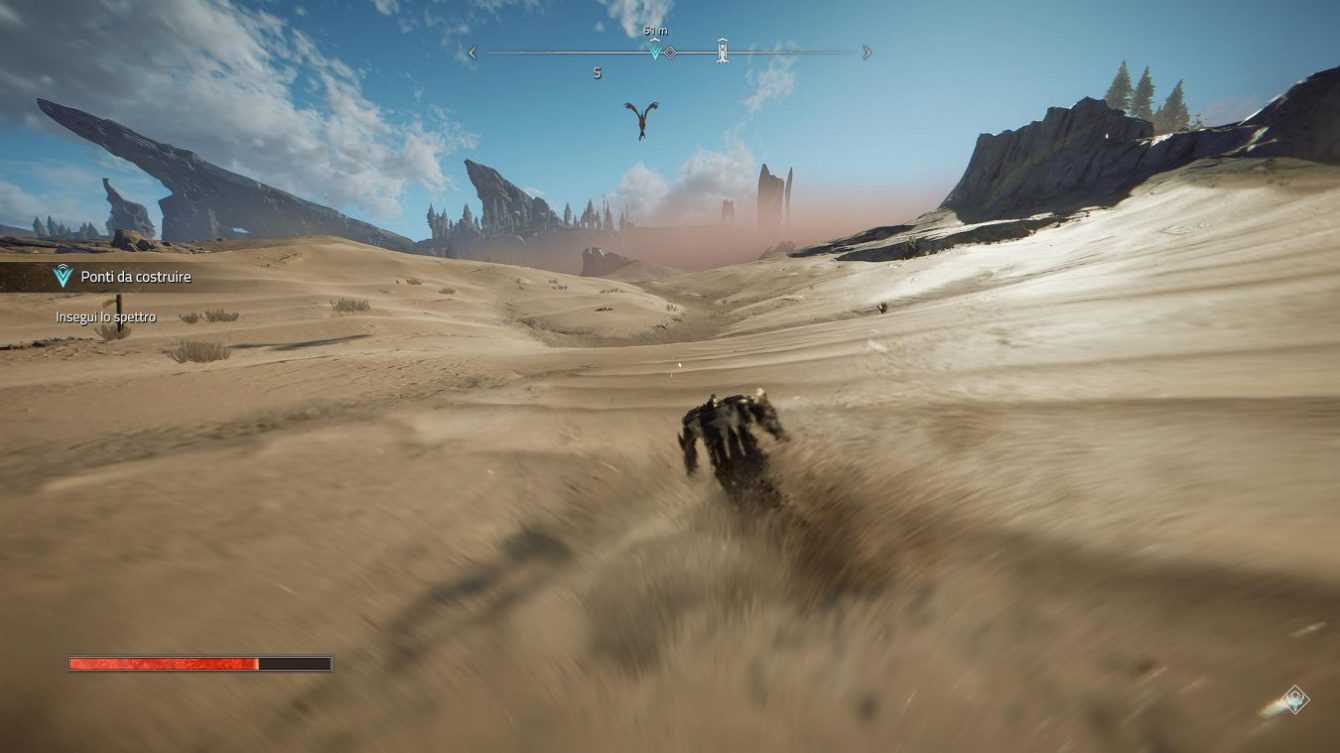
Oh no oh no! | Atlas Fallen review
Another big sore point of Atlas Fallen, which we cannot help but talk about in the review, is definitely the technical sector. We played Deck13’s title on PlayStation 5 and, after the classic choice between Quality Mode and Performance, we opted for the latter aware that we always prefer frame rate stability rather than superfine quality. Well, in the end, we got neither.
Even in Performance Mode, Atlas Fallen suffers from very frequent and very annoying drops in frame rate, not only in the most agitated fights, but also in the exploration phases and (hear hear you) also in the dialogues and films. Not only that, just the speed of exploration leads to a constant and at times tedious pop-in phenomenon of objects on the screen, which is not limited to the sparse grass or small objects, but to real buildings or NPCs.
All this is seasoned with a low number of basic polygons, especially in the modeling of the characters, which slightly improves as regards the level of detail of the settings. A careful, but not excellent, artistic direction concludes what it undoubtedly is a medium-low level production technical apparatusbut that we would have preferred at least more stable and less patchy performance-wise on a console that ran much worse.
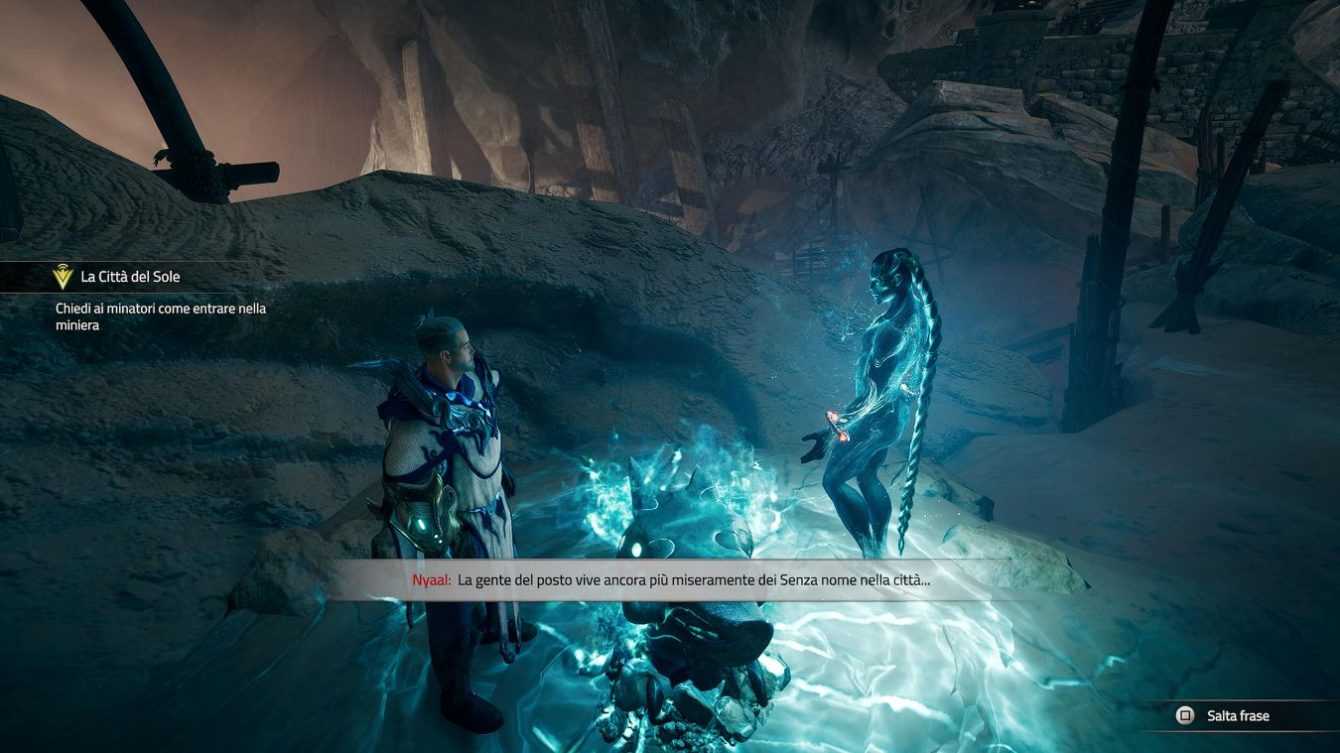
Maybe discounted yes!
We conclude this Atlas Fallen review by taking up our initial lines: not all video games can be epochal. We can’t always find ourselves faced with the God of War or Final Fantasy XVI of the situation, there is an undergrowth of titles without infamy and without praise that still deserves to be experienced and, why not, fully enjoyed. Atlas Fallen is full of flaws, from a technical apparatus below the sufficiency to a dull and easily forgettable narrative, but pad in hand it does what a video game should do: it’s fun. The exploratory and combat phases, regardless of some inaccuracies and some not well managed elements, will make you spend about fifteen hours in the frenzy and desire to beat a boss again, before shutting down. As long as it doesn’t come off half an inch off the ground. But don’t get it at full price.
Atlas Fallen is currently available on PC, PS5 and Xbox Series X | S. Let us know what you think below in the comments, we will continue to keep you updated with all the gaming and tech news, guides and reviews! And if you are interested in game keys at advantageous prices, we suggest you take a look at the Kinguin catalogue!
You can do more, but also less
Plus points
- Fast and fun exploration
- Discreet art direction
- Fast-paced and exciting combat system…
Points against
- … except for flying enemies
- Technically below the sufficiency
- A dull and forgettable narrative






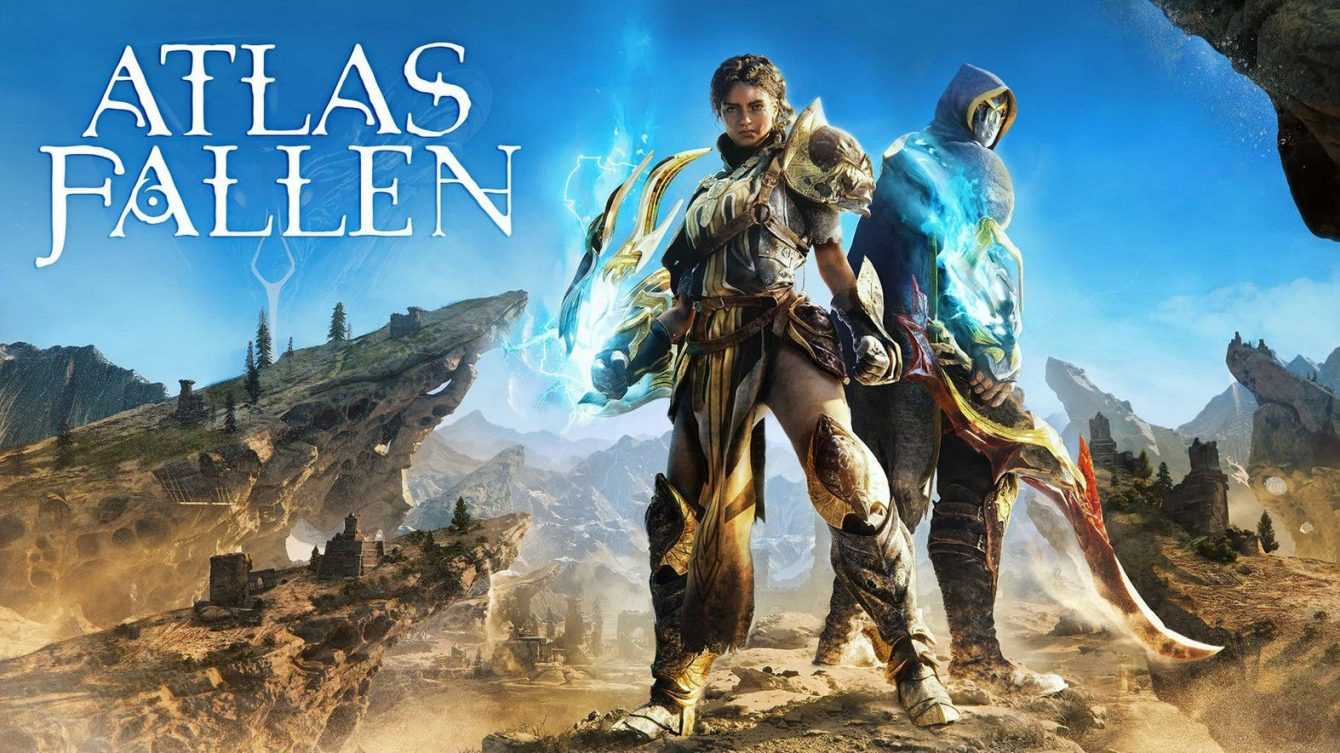





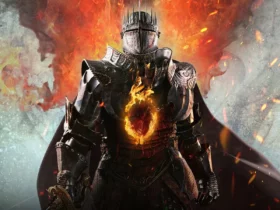
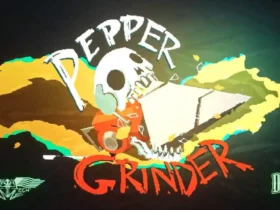

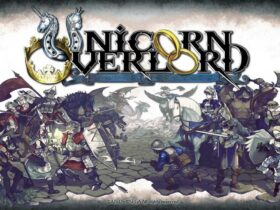
Leave a Reply
View Comments